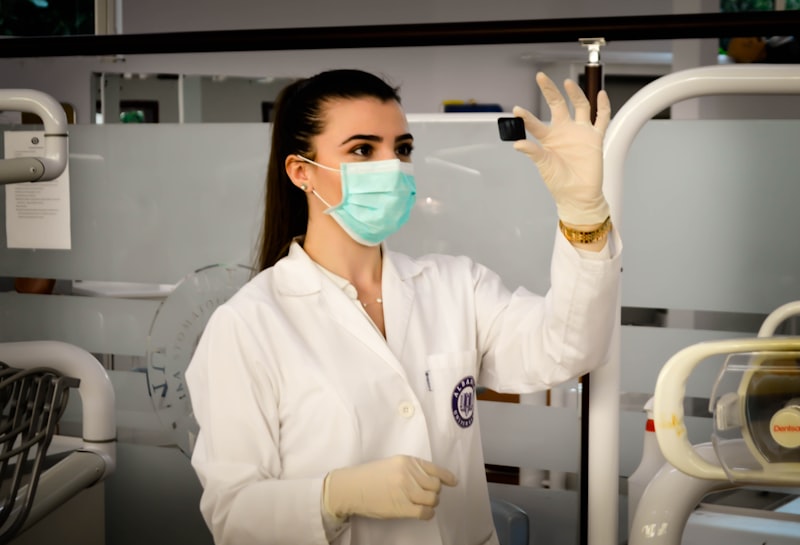Health education is a vital aspect of our lives, enabling us to make informed decisions about our well-being. It equips individuals with the knowledge and skills necessary to lead healthy lifestyles, prevent diseases, and promote overall wellness. In this article, we will explore the significance of health education and how it positively impacts our lives.
At its core, health education goes beyond merely providing information; it aims to inspire and empower individuals to take ownership of their health. By understanding the implications of their choices, people can make informed decisions that have a profound impact on their overall quality of life. This knowledge serves as a catalyst for personal growth, encouraging healthier habits and routines that can span generations.

Imagine health education as a guiding light, illuminating the path towards a healthier future. It empowers individuals to navigate complex health-related issues, such as proper nutrition, exercise, mental health, and disease prevention. By gaining insights into these topics, individuals build a strong foundation of knowledge that empowers them to optimize their physical and mental well-being.
The benefits of health education extend far beyond individual empowerment. It also plays a crucial role in building healthier communities and societies at large. When individuals are equipped with accurate health information, they become advocates for positive change, inspiring others to embrace healthier lifestyles. This ripple effect creates a supportive environment where everyone strives for wellness, ultimately reducing the burden on healthcare systems and improving overall public health.
Just like a well-tailored suit enhances one's appearance, health education enhances our ability to lead fulfilling lives. It equips us with tools to recognize red flags, make informed choices, and seek appropriate medical help when needed. Moreover, it encourages us to adopt preventive measures to avoid potential health risks, ultimately promoting a proactive approach to well-being.
Health education is a transformative force that empowers individuals, communities, and societies. By arming ourselves with knowledge and skills, we can make informed decisions about our health and inspire others to do the same. It paves the way for a brighter future, where wellness is cherished, diseases are prevented, and individuals thrive in their pursuit of a fulfilling life.
Revolutionizing Health Education: How New Technologies Are Transforming Learning

Are you ready to embark on a journey of revolutionary health education? In this digital era, new technologies are transforming the way we learn about our well-being. With advancements in technology, traditional methods are being left behind as innovative tools and platforms take center stage. So, what are these new technologies that are revolutionizing health education?
One of the game-changers is virtual reality (VR). Imagine immersing yourself in a virtual world where you can explore the human body from the inside out. VR allows students to visualize complex anatomical structures and processes in a three-dimensional space, making learning engaging and interactive. Students can dissect virtual organs, witness how diseases affect different systems, and even simulate medical procedures. It's like having a personal tour guide through the human body!
Another groundbreaking technology is augmented reality (AR). Unlike VR, AR overlays digital information onto the real world. Through AR apps and devices, students can scan objects or textbooks to unlock hidden layers of information. For instance, pointing a smartphone at a diagram of the heart can trigger an AR animation that demonstrates how blood flows through its chambers. This hands-on experience enables students to grasp concepts more effectively, making learning truly come to life.
Let's not forget about the power of artificial intelligence (AI) in health education. AI algorithms can analyze vast amounts of medical data and provide personalized insights and recommendations. Intelligent tutoring systems powered by AI can adapt to individual learning styles and pace, offering tailored content and assessments. AI chatbots can also serve as virtual tutors, answering students' questions and guiding them through their learning journey. With AI, students can receive personalized support and enhance their understanding of complex medical concepts.
New technologies are revolutionizing health education by introducing immersive experiences, enhancing interactivity, and providing personalized learning opportunities. Virtual reality, augmented reality, and artificial intelligence are transforming the way we learn about our bodies and medical sciences. These innovative tools empower students to explore, experiment, and engage, making health education more captivating and effective than ever before. So, are you ready to embrace these technologies and revolutionize your learning experience?
From Classroom to Clinic: The Power of Experiential Learning in Health Education
Introduction: Have you ever wondered how theory connects with practice in the field of health education? Enter experiential learning, a powerful approach that bridges the gap between the classroom and the clinic. In this article, we will delve into the transformative impact of experiential learning on health education and explore how it enriches the educational journey of aspiring healthcare professionals.
Unleashing Practical Skills: Experiential learning takes learning beyond textbooks and lectures, immersing students in real-life scenarios. By actively engaging in hands-on experiences, students gain practical skills that are integral to their future careers. From conducting patient interviews to administering treatments under supervision, these immersive learning opportunities provide invaluable exposure to the realities of healthcare settings. As a result, students develop confidence, critical thinking abilities, and problem-solving skills necessary for success in their professional endeavors.
Connecting with Diverse Populations: Healthcare professionals interact with individuals from diverse backgrounds, and experiential learning offers a unique opportunity to develop cultural competence. By working with patients and communities during their training, students learn to navigate various cultural nuances and understand the importance of providing culturally sensitive care. This fosters empathy and helps break down barriers, ensuring that future healthcare professionals can effectively communicate and connect with patients from all walks of life.
Enhancing Teamwork and Collaboration: In the fast-paced world of healthcare, teamwork and collaboration are paramount. Experiential learning environments simulate multidisciplinary healthcare teams, allowing students to collaborate with colleagues from different disciplines. Through collaborative problem-solving, students learn to work together, respect each other's expertise, and effectively communicate to deliver optimal patient care. These experiences cultivate the essential teamwork skills required for seamless coordination within healthcare teams.
Improving Decision-Making Skills: Experiential learning presents students with real-world challenges and allows them to make decisions in a supportive environment. This hands-on approach helps students develop critical decision-making skills that will be vital in their future healthcare careers. By grappling with complex cases, students learn to analyze information, weigh options, and make informed choices. These experiences build their confidence in making clinical decisions and prepare them to navigate the complexities of patient care.
Conclusion: Experiential learning is a game-changer in health education, bridging the gap between classroom theories and real-world practice. Through immersive experiences, students develop practical skills, connect with diverse populations, enhance teamwork abilities, and sharpen their decision-making prowess. By integrating experiential learning into health education curricula, we empower aspiring healthcare professionals to become competent, compassionate, and well-rounded practitioners who are ready to make a positive impact on the lives of others.
Mind over Matter: Exploring the Importance of Mental Health Education in Schools
Introduction: Have you ever wondered how important mental health education is for students? In the fast-paced and demanding world we live in, it's crucial to prioritize not only academic success but also the well-being of our youth. Mental health education in schools plays a vital role in equipping students with the necessary knowledge and skills to navigate life's challenges. Let's dive into why this topic is of utmost importance.
Creating Awareness and Reducing Stigma: One significant aspect of mental health education in schools is creating awareness and reducing the stigma surrounding mental health issues. By openly discussing mental health, students can gain a better understanding of their own emotions and those of others. This knowledge promotes empathy, compassion, and inclusivity within the school community, fostering an environment where seeking help is seen as a sign of strength rather than weakness.
Building Resilience and Coping Skills: Life is full of ups and downs, and having strong resilience and coping skills is essential for overall well-being. Mental health education provides students with strategies and tools to manage stress, anxiety, and other emotional challenges effectively. By learning techniques such as mindfulness, self-care, and problem-solving, students develop the ability to bounce back from setbacks and adapt to difficult situations—an invaluable skillset that will benefit them throughout their lives.
Preventing Mental Health Issues: Prevention is often more effective than intervention. Mental health education equips students with the knowledge to identify early warning signs of mental health issues in themselves or their peers. By recognizing these signs, students can seek timely support and intervention, potentially preventing the development of more severe conditions. Educating students about the importance of self-care, healthy relationships, and stress management empowers them to take control of their mental well-being.
Empowering Students: Mental health education empowers students by giving them a sense of agency over their own mental health. When students understand the factors that influence mental well-being, they can make informed decisions and take proactive steps to maintain and improve their mental health. This empowerment carries beyond the school years and prepares students for a lifetime of self-care and emotional resilience.
In Conclusion:
Empowering Communities: The Rise of Peer-to-Peer Health Education Programs
Have you ever wondered how communities can come together to create a positive impact on their health? In recent years, an exciting trend has emerged: peer-to-peer health education programs. These innovative initiatives empower individuals within a community to share their knowledge, experiences, and insights, ultimately fostering a healthier and more informed population.
Peer-to-peer health education programs operate on the belief that everyone has something valuable to contribute. Instead of relying solely on healthcare professionals, these programs encourage community members to become active participants in promoting well-being. By leveraging the power of shared experiences, these initiatives create a supportive environment where information flows freely.
Imagine a world where a new mother struggling with postpartum depression could connect with another woman who has successfully overcome similar challenges. Peer-to-peer health education programs make this possible. Through support groups and online platforms, individuals facing similar health issues can exchange stories, advice, and resources. This empathetic connection builds a sense of belonging and inspires hope, fostering a stronger community spirit.
These programs address a wide range of health topics, from mental health and chronic diseases to nutrition and fitness. For instance, in a peer-led diabetes management program, individuals living with diabetes can learn from others who have successfully managed the condition. They gain practical tips, receive emotional support, and discover effective strategies for coping with the daily challenges of the disease. This kind of personalized guidance goes beyond medical knowledge and taps into the wisdom of lived experiences.
One of the key advantages of peer-to-peer health education programs is their accessibility. Unlike traditional healthcare settings, which can be intimidating or costly, these initiatives break down barriers by providing information and support in a comfortable, relatable manner. By harnessing the power of storytelling and informal communication, they speak directly to the community, making health education engaging and relevant.
Moreover, these programs not only empower individuals but also strengthen the entire community's health literacy. By disseminating accurate information and encouraging critical thinking, they equip community members with the knowledge they need to make informed decisions about their well-being. This ripple effect extends beyond individuals and creates healthier families, neighborhoods, and societies as a whole.
Peer-to-peer health education programs are revolutionizing the way communities learn about and improve their health. By tapping into the collective wisdom and experiences of community members, these initiatives empower individuals, foster empathy and connection, and enhance health literacy. As we continue to embrace this rising trend, we can look forward to stronger, more resilient communities where everyone plays an active role in promoting well-being.